Unit_3_Could_you_please_clean_your_room?单元测试题
人教版八年级英语下-unit3-could-you-please-clean-your-room教案
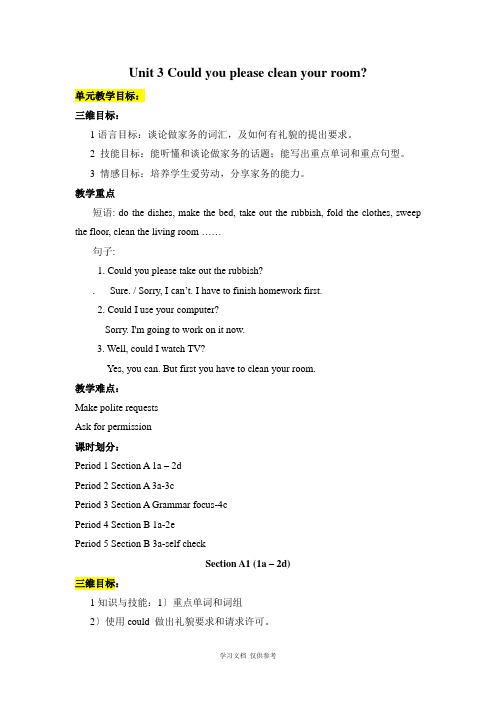
Unit 3 Could you please clean your room?单元教学目标:三维目标:1语言目标:谈论做家务的词汇,及如何有礼貌的提出要求。
2 技能目标:能听懂和谈论做家务的话题;能写出重点单词和重点句型。
3 情感目标:培养学生爱劳动,分享家务的能力。
教学重点短语: do the dishes, make the bed, take out the rubbish, fold the clothes, sweep the floor, clean the living room ……句子:1. Could you please take out the rubbish?. Sure. / Sorry, I can’t. I have to finish homework first.2. Could I use your computer?Sorry. I'm going to work on it now.3. Well, could I watch TV?Yes, you can. But first you have to clean your room.教学难点:Make polite requestsAsk for permission课时划分:Period 1 Section A 1a – 2dPeriod 2 Section A 3a-3cPeriod 3 Section A Grammar focus-4cPeriod 4 Section B 1a-2ePeriod 5 Section B 3a-self checkSection A1 (1a – 2d)三维目标:1知识与技能:1〕重点单词和词组2〕使用could 做出礼貌要求和请求许可。
2.过程与方法:通过合作探究的方法结局本课的重点知识点3.情感态度与价值:学会照顾自己,培养自己的独立意识。
教学重点:谈论做家务的词汇,情态动词could的使用方法。
Unit-3-Could-you-please-clean-your-room-练习-及答案
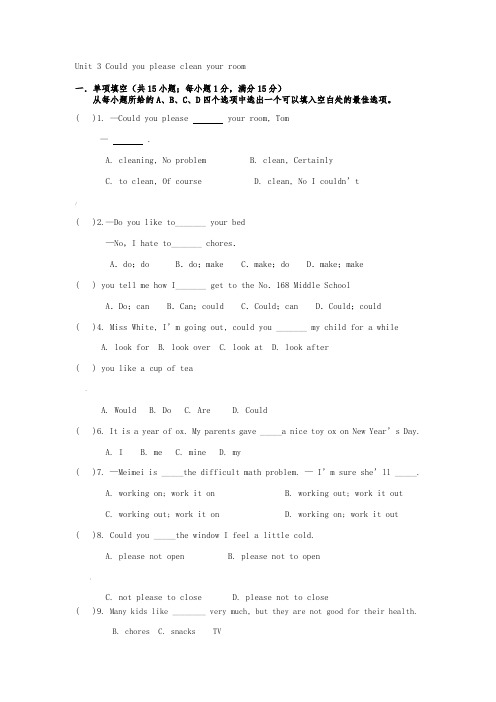
Unit 3 Could you please clean your room一.单项填空(共15小题;每小题1分,满分15分)从每小题所给的A、B、C、D四个选项中选出一个可以填入空白处的最佳选项。
( )1. —Could you please your room, Tom— .A. cleaning, No problemB. clean, CertainlyC. to clean, Of courseD. clean, No I couldn’t/( )2.—Do you like to_______ your bed—No,I hate to_______ chores.A.do;do B.do;make C.make;do D.make;make( ) you tell me how I_______ get to the No.168 Middle SchoolA.Do;can B.Can;could C.Could;can D.Could;could( )4. Miss White, I’m going out, could you _______ my child for a whileA. look forB. look overC. look atD. look after( ) you like a cup of tea-A. WouldB. DoC. AreD. Could( )6. It is a year of ox. My parents gave _____a nice toy ox on New Year’s Day.A. IB. meC. mineD. my( )7. —Meimei is _____the difficult math problem. —I’m sure she’ll _____.A. working on; work it onB. working out; work it outC. working out; work it onD. working on; work it out( )8. Could you _____the window I feel a little cold.A. please not openB. please not to open:C. not please to closeD. please not to close( )9. Many kids like ________ very much, but they are not good for their health.B. choresC. snacks TV( )10.—Could I use your computer, Dad—Sorry, you _______. I’m going to work on it.A. wouldn’tB. can’tC. needn’tD. don’t have to( )11. ─ _____ do you do the dishes ─ Every day.A. How soonB. How longC. How oftenD. When;( )12. —Could you buy us _________ drinks—Sorry, I don’t have _____ money.A. any; anyB. any; someC. some; someD. some; any( )13. Excuse me, Peter. There’s something wrong with my car. Could IA. go for a driveB. get a rideC. give me a rideD. go for a walk ( )14. There are still a few hamburgers. Would you like to have one, JuliaA. the otherB. otherC. othersD. another( )15. My dad tells me not to ________ too late in the evening. He says it is dangerous.%A. stay outB. grow upC. come outD. get up二.完形填空(共10小题;每小题2分,满分20分)阅读下列短文,从每小题所给的A、B、C、D四个选项中选出一个最佳选项。
2019年八年级英语下册 Unit 3 Could you please clean your room知识点总结 (新版)人教新目标版
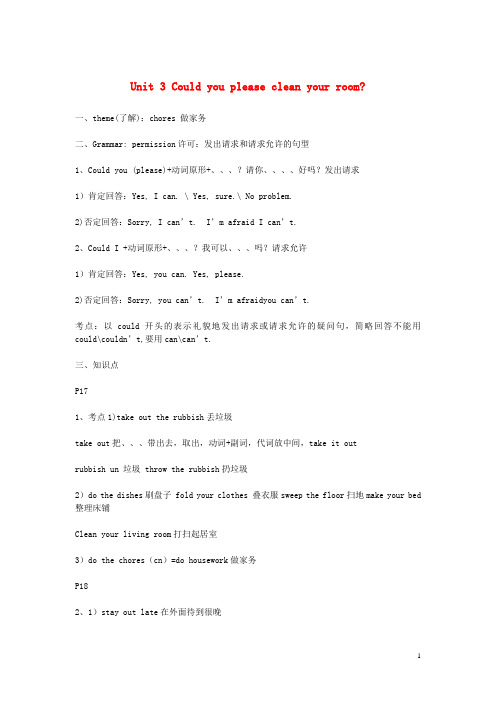
Unit 3 Could you please clean your room?一、theme(了解):chores 做家务二、Grammar: permission许可:发出请求和请求允许的句型1、Could you (please)+动词原形+、、、?请你、、、、好吗?发出请求1)肯定回答:Yes, I can. \ Yes, sure.\ No problem.2)否定回答:Sorry, I can’t. I’m afraid I can’t.2、Could I +动词原形+、、、?我可以、、、吗?请求允许1)肯定回答:Yes, you can. Yes, please.2)否定回答:Sorry, you can’t. I’m afraidyou can’t.考点:以could开头的表示礼貌地发出请求或请求允许的疑问句,简略回答不能用could\couldn’t,要用can\can’t.三、知识点P171、考点1)take out the rubbish丢垃圾take out把、、、带出去,取出,动词+副词,代词放中间,take it outrubbish un 垃圾 throw the rubbish扔垃圾2)do the dishes刷盘子 fold your clothes 叠衣服sweep the floor扫地make your bed 整理床铺Clean your living room打扫起居室3)do the chores(cn)=do housework做家务P182、1)stay out late在外面待到很晚2)get a ride 搭便车 3)need to do sth 需要做某事(need实义动词)need do sth(情态动词)4)have to do sth 不得不做某事3、1)help (sb) out with sth帮助(某人)做某事(常指帮助某人摆脱困境)2)at least至少3)finish doing sth做完某事4、1)Two hours of TV isenough for you.短语(名词短语、现在分词短语、不定式短语)作主语,谓语动词用单数。
八年级英语Unit3.Could-you-please-clean-your-room课件

She’s cleaning the floor
Poor Cinderela ! She has to do all the chores at home.
One day, the king invited all the girls to his party. Look! Cinderela’s step mother(继母) is taking her two ugly daughters to the party.
Could I (please) do…?
What chores do you do at home?
We Love our parents. We help do the
chores.
clean the room
sweep the floor
do the dishes
take out the trash fold the clothes
八年级英语Unit3.Could-you-please-clean-yourroom课件
Learning goals(学习目标)
• words and exepressions • making polite requests
Clould you please do …? • asking for permission
Peter wants to…
Peter’s father says…
go to the yes no movies
stay out late
yes no
use the car
yes no
get a ride yes no
His father’s reasons
I have to do some work. You have to clean your room. I need to eat breakfast. you have a basketball game
八年级英语Unit3 Could you please clean your room课文讲解

八年级英语Unit3 Could you please clean your room课文讲解Unit 3: Could You Please Clean Your Room?n A:1."Peter。
could you please take out the trash?" This is apolite request asking Peter to take out the garbage。
"Could you please do something?" is a polite way to ask for ___ or assistance。
"Could" is a more polite way to ask than "can." The response tothis request can be "Sure," "Of course," "Certainly," or "No problem." If the person cannot do it。
they can say "Sorry。
Ican't." "Take out" means to remove something from a place。
When using a pronoun as the object。
it should be placed in the middle of the phrase。
For example。
"You can take it out."2."Can you do the dishes?" This is asking if the person can wash the dishes。
八年级英语下册-Unit-3-Could-you-please-clean-your-room-Se
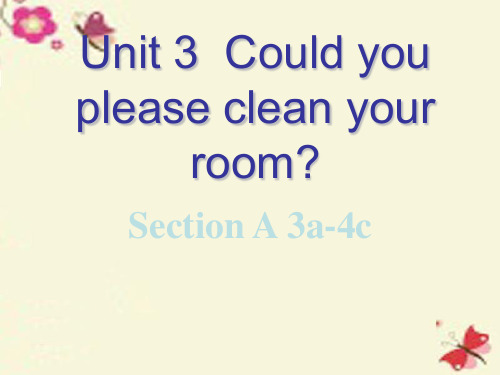
3b
Read the sentences below. Underline the sentences from the reading that mean the same thing.
1. Neither of us did any housework for a week. For one week, she did not do any housework and neither did I. 2. My mom came over as soon as I sat down in front of the TV. The minute I sat down in front of the TV, my mom came over. 3. You're tired, but I'm tired, too. Well, I work all day at school, too! I'm just as tired as you are!
not to get it wet.
1—d 2—a 3—c 4—e 5—b
4b Fill in the blanks in the conversation.
A: I hate to __d__o__ chores.
B: Well, I hate some chores too, but I like other chores.
2. Could I watch one show first? (noun) ___C_o_u_l_d_y_o_u__p_l_ea_s_e__sh_o_w__m__e_y_o_u__r_n_e_w__b_o_o_k_?__(v_e_r_b_)___ 3. I can't work all day. (verb) __I_t_’s__d_if_f_ic_u_l_t_t_o_f_in__d_w__o_rk__i_n_t_h_i_s_c_it_y_._(_n_o_u_n_)________ 4. You watch TV all the time. (verb) __H__o_w__m__u_c_h_i_s_t_h_a_t_w_a_t_c_h_?__(n_o_u__n_) _________________ 5. “What happened?” she asked in surprise. (noun) __I_t_w__o_n_'t__su__rp__ri_s_e_m__e_i_f_h_e_l_o_s_e_s_t_h_e_e_x_a_m__. _(v_e_r_b_)_____
Unit 3 Could you please clean your room?(解析版)
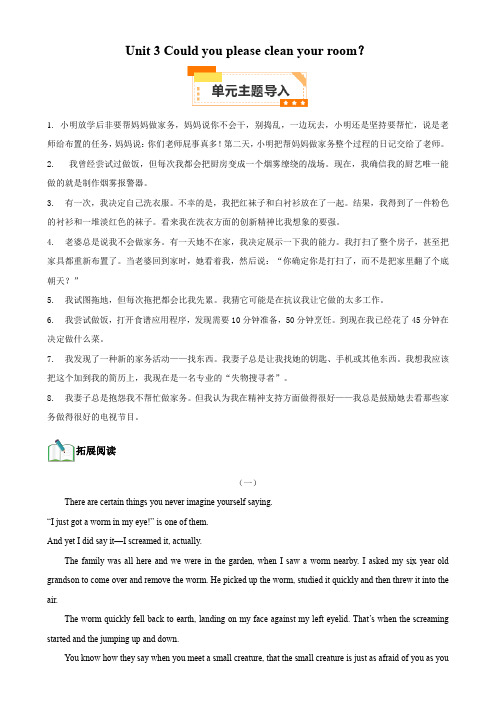
Unit 3 Could you please clean your room?1.小明放学后非要帮妈妈做家务,妈妈说你不会干,别捣乱,一边玩去,小明还是坚持要帮忙,说是老师给布置的任务,妈妈说:你们老师屁事真多!第二天,小明把帮妈妈做家务整个过程的日记交给了老师。
2.我曾经尝试过做饭,但每次我都会把厨房变成一个烟雾缭绕的战场。
现在,我确信我的厨艺唯一能做的就是制作烟雾报警器。
3. 有一次,我决定自己洗衣服。
不幸的是,我把红袜子和白衬衫放在了一起。
结果,我得到了一件粉色的衬衫和一堆淡红色的袜子。
看来我在洗衣方面的创新精神比我想象的要强。
4. 老婆总是说我不会做家务。
有一天她不在家,我决定展示一下我的能力。
我打扫了整个房子,甚至把家具都重新布置了。
当老婆回到家时,她看着我,然后说:“你确定你是打扫了,而不是把家里翻了个底朝天?”5. 我试图拖地,但每次拖把都会比我先累。
我猜它可能是在抗议我让它做的太多工作。
6. 我尝试做饭,打开食谱应用程序,发现需要10分钟准备,50分钟烹饪。
到现在我已经花了45分钟在决定做什么菜。
7. 我发现了一种新的家务活动——找东西。
我妻子总是让我找她的钥匙、手机或其他东西。
我想我应该把这个加到我的简历上,我现在是一名专业的“失物搜寻者”。
8. 我妻子总是抱怨我不帮忙做家务。
但我认为我在精神支持方面做得很好——我总是鼓励她去看那些家务做得很好的电视节目。
拓展阅读(一)There are certain things you never imagine yourself saying.“I just got a worm in my eye!” is one of them.And yet I did say it—I screamed it, actually.The family was all here and we were in the garden, when I saw a worm nearby. I asked my six-year-old grandson to come over and remove the worm. He picked up the worm, studied it quickly and then threw it into the air.The worm quickly fell back to earth, landing on my face against my left eyelid. That’s when the screaming started and the jumping up and down.You know how they say when you meet a small creature, that the small creature is just as afraid of you as youare of it? They lie.The worm showed no fear. I, however, am still having nightmares about the experience, which was several days ago.The most important thing in all this is that my grandson said he was sorry to me.I’d just been reading a book that makes a connection between adults doing the slow and hard work of teaching manners to children and greater levels of civility in society.Table manners, language manners and even manners in dress all show levels of self-control.Having self-control limits what we say and how we behave, making many of us appear a good deal better than we really are.Good manners also have the possibility to make mealtime a pleasant experience, even with small children.All of my grandchildren, except the ones that can’t yet talk, ask to be excused before leaving the table.It is a sign of respect for others at the table and a sign of respect for the meal itself. It’s also more pleasant than pushing one’s chair back and running for the back yard.Those tall enough, and even those not tall enough, also take their dishes to the kitchen.Manners are what civilize us—around our tables, in our families, homes and our communities.So when a little boy has the courage to apologize to a grandma who is screaming and jumping up and down, at least we know that our years of teaching young people manners are paying off—one worm at a time. 1.Where were they when the author saw a worm?A.In the house.B.In the garden.C.In the park.D.In the back yard.2.The worm fell down on the author’s________.A.leg B.head C.left eyelid D.right eyelid3.What does the underlined word “nightmares” mean?A.好运B.噩梦C.回忆D.愿望4.The author believed that his grandson’s apology is________.A.a good manner B.a bad behavior C.unnecessary D.a must5.What does the passage tell us?A.The importance of apology.B.The importance of good manners.C.Many kinds of good manners.D.A story of a worm.【答案】1.B 2.C 3.B 4.A 5.B【导语】本文主要以作者与其孙子的故事来讲述礼仪的重要性。
八年级下册人教版英语Unit3_Could_you_please_clean_your_room课件
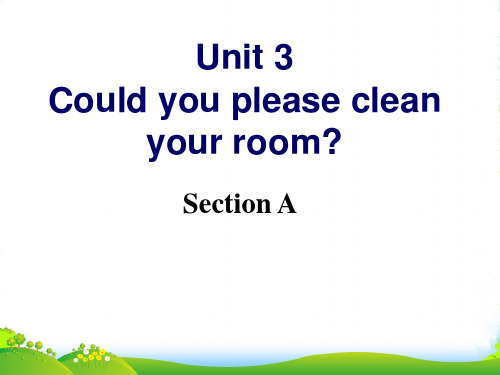
2. have to有人称、数、时态的变化, 而must只有一种形式。但must 可 用于间接引语中表示过去的必要 或义务。
He had to look after his sister yesterday.
3. 在否定结构中: don’t have to 表示 “不必”, mustn’t 表示“禁止”。 You don’t have to tell him about it. 你不一定要把此事
√
room
1c Pairwork
A: Could you please sweep the floor? B: Yes, sure. / I’m sorry, but I’m
reading the newspaper.
2a Listening and check “yes” or “no”.
have to和must
1. 两词都是 “必须”的意思, have to 表示客观的需要, must 表示 说话人主观上的看法, 既主观 上的必要。
My brother was very ill, so I had to call the doctor in the middle of the night. 我弟弟病得很厉害,我只得半夜里 把医生请来。(客观上需要做这件事) He said that they must work hard. 他说他们必须努力工作。 (主观上要做这件事)
cooking. I _c_a_n_ come later. 2. - _M__u_st_ we clean the windows today?
- No, you _n_e_e_d_n_’_t. You __c_a_nclean them tomorrow.
3. - _M__a_y I watch TV this evening, mum? - No, you _m_u__st_n_’_t. Work _m__u_s_t come first.
人教版八年级下英语Unit 3 Could you please cleanyourroom知识总结
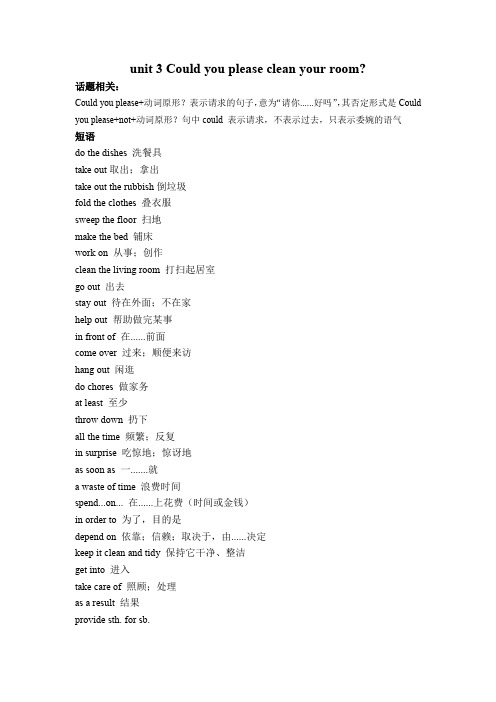
unit 3 Could you please clean your room?话题相关:Could you please+动词原形?表示请求的句子,意为“请你......好吗”,其否定形式是Could you please+not+动词原形?句中could 表示请求,不表示过去,只表示委婉的语气短语do the dishes 洗餐具take out取出;拿出take out the rubbish倒垃圾fold the clothes 叠衣服sweep the floor 扫地make the bed 铺床work on 从事;创作clean the living room 打扫起居室go out 出去stay out 待在外面;不在家help out 帮助做完某事in front of 在......前面come over 过来;顺便来访hang out 闲逛do chores 做家务at least 至少throw down 扔下all the time 频繁;反复in surprise 吃惊地;惊讶地as soon as 一.......就a waste of time 浪费时间spend...on... 在......上花费(时间或金钱)in order to 为了,目的是depend on 依靠;信赖;取决于,由......决定keep it clean and tidy 保持它干净、整洁get into 进入take care of 照顾;处理as a result 结果provide sth. for sb.=provide sb. with sth. 为某人提供某物a developed country 一个发达国家a developing country 一个发展中国家a life of independence 独立的生活an independent country 一个独立自主的国家have no idea “不知道”=don't knowtake care of “照顾;处理”=look after=care for take good care of “好好照顾......”=look after.....well as a result 结果;因此as a result of 由于.......;作为......结果句型和固定结构finish doing sth. 做完某事neither+连系动词be/助动词/情态动词+主语. .....也不hate to do sth. 厌恶做某事let sb. do sth. 让某人做某事spend...doing sth. 花费......做某事provide sth. for sb. 向某人提供某物learn to do sth. 学会做某事learn how to do sth. 学会怎样做某事do one's part in (doing) 尽自己的职责做某事as.....as... 与.......一样not as/so...as... 不如......borrow sth. from sb. “向某人借某物”hate sb./sth. 讨厌某人/某物hate to do sth./doing sth. 厌恶做某事enjoy doing sth 喜欢做某事buy sb.sth.=buy sth. for sb. "给某人买某物invite sb. to +地点名词“邀请某人到某地”invite sb. to do sth. “邀请某人做某事”make sb. do sth. 让/使某人做某事help with sth. =help (to) do sth.帮忙做某事There is no need for sb. to do sth.“对于某人来说,没有必要做某事”解释minute n.分钟;片刻(1)any minute now “随时;马上;在任何时刻”,表示事情有可能在极短的时间内发生或眼下就要发生。
Unit 3 Could you please clean your room_知识点讲义

人教版八年级下册Unit3讲义重点句法词法:一、Could 的用法Could表示有礼貌地提出请求,征求许可,其用法如下:1.Could 表示有礼貌地提出请求。
Could you (please) do...?表示“请你做...好吗?”could you (please) do...?的否定结构是在please 后加not。
Could you (please) open the window ?2.Could表示征求许可,希望得到允许。
句型Could I do...?表示“我可以做...吗?”Could I go to the movies?3.回答时应注意几个问题:(1)对这样的句式作答时,与其它的一般疑问句不同,作肯定回答通常用certainly, sure, of course等。
作否定回答时,通常以sorry开头。
(2)回答could引导的问句时要用can或can’t,不能用could。
二、情态动词表示说话人语气的单词。
不能单独做谓语,只能和动词原形1、情态动词没有人称和数的变化,情态动词后面跟的动词须用原形,否定式构成是在情态动词后面加"not"。
例: She can sing an English song.We should do our homework right now.I can’t speak English very well.三、情态动词的用法(1)Can的用法①表示体力或脑力方面的“能力”Can you speak English?你会说英语吗?②表示客观条件允许You can’t park your car here.你不能在此停车③can用在否定句和疑问句中时,有时表示说话人的怀疑,惊异、猜测或不肯定:He can’t be in the library。
他现在不会在图书馆。
四、borrow、lend、keepborrow和lend都有“借”的意思,但它们的含义和用法有所不同。
人教版 八年级英语 下册 Unit3Could_you_please_clean_your_room
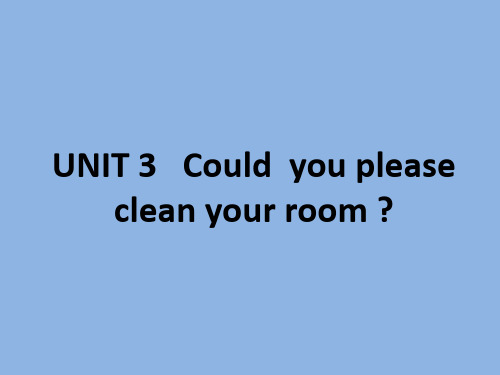
invite my friends to a party
go to the store use your CD player
Listen to a conversation between Sandy
a party? Parent: No, you can’t have a party.
You have a test on Monday.
Parent: Could you please…? Child: Yes, sure. / Sorry, I can’t. I
have to ...
clean your room
parents
5. go to the store 6. use your CD player 7. take out the rubbish
parents 8. make your bed
1b Use the phrases in 1a to make
conversations.
Parent: Could you clean your room? Child: Yes, I can. Child: Could I invite my friends to
Li Lei can’t dance , neither can I. neither can Mary. neither can we.
Neither of …是both of … 的否定句 Both of my parents are teathers .(否定句) Neither of my parents is a teacher .
人教版英语八年级下册Unit 3《Could you please clean your room》
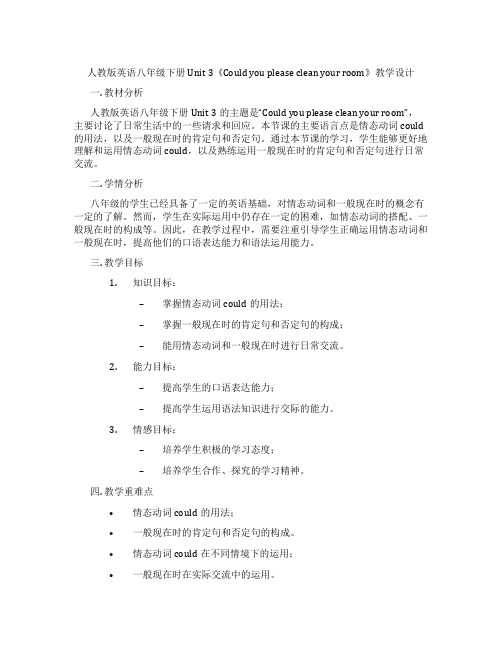
人教版英语八年级下册Unit 3《Could you please clean your room》教学设计一. 教材分析人教版英语八年级下册Unit 3的主题是“Could you please clean your room”,主要讨论了日常生活中的一些请求和回应。
本节课的主要语言点是情态动词could 的用法,以及一般现在时的肯定句和否定句。
通过本节课的学习,学生能够更好地理解和运用情态动词could,以及熟练运用一般现在时的肯定句和否定句进行日常交流。
二. 学情分析八年级的学生已经具备了一定的英语基础,对情态动词和一般现在时的概念有一定的了解。
然而,学生在实际运用中仍存在一定的困难,如情态动词的搭配、一般现在时的构成等。
因此,在教学过程中,需要注重引导学生正确运用情态动词和一般现在时,提高他们的口语表达能力和语法运用能力。
三. 教学目标1.知识目标:–掌握情态动词could的用法;–掌握一般现在时的肯定句和否定句的构成;–能用情态动词和一般现在时进行日常交流。
2.能力目标:–提高学生的口语表达能力;–提高学生运用语法知识进行交际的能力。
3.情感目标:–培养学生积极的学习态度;–培养学生合作、探究的学习精神。
四. 教学重难点•情态动词could的用法;•一般现在时的肯定句和否定句的构成。
•情态动词could在不同情境下的运用;•一般现在时在实际交流中的运用。
五. 教学方法1.任务型教学法:通过设定各种现实生活中的任务,引导学生运用所学知识进行完成,提高学生的实际运用能力。
2.情境教学法:创设各种生活情境,让学生在真实的环境中感受和理解语法知识。
3.合作学习法:学生进行小组讨论和合作,培养学生的团队精神和学习兴趣。
六. 教学准备1.教学材料:人教版英语八年级下册教材;2.教学辅助材料:PPT、图片、卡片等;3.教学设备:投影仪、电脑、黑板等。
七. 教学过程1.导入(5分钟)–利用PPT展示一些杂乱的房间图片,引导学生谈论房间的情况,激发学生的学习兴趣。
八年级英语下册Unit3《Couldyoupleasecleanyourroom》(讲)(含解析)(新版)人教新目标版
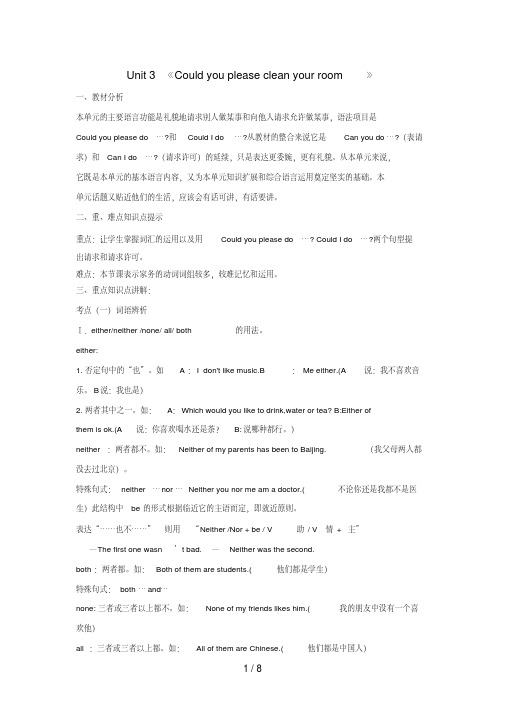
(3) be +adj. +enough to do sth be strong enough to carry the box. 【典型例题 3】 1.Jack ran ______ to catch up with other students. A. enough fast B. enough slow C. fast enough D. slow enough 【答案】 C
4/8
【解析】
试题分析:句意:杰克跑得足够快,赶上了其他同学。
enough 修饰形容词或副词时,位于
形容词或副词的后面。故排除 AB两项。 fast 快的; slow 慢的。根据 catch up with
other students. 赶上了其他同学,可知他跑得快 fast ,故选 C。
考点:考查副词的用法
2.That boy is not
to g o to school
. He is only three years old
.
A. young enough
B
. old enough
C. enough young
D
【答案】 B
. enough old
【解析】
试题分析:句意:这个小男孩年龄不够大,不能去学校。他只有三岁。 词/ 副词 +enough. 足够的 .... 。
在表示请求帮助或请求允许的疑问句中,常用
could 代替 can ,以表示礼貌,委婉或不
unit3could you please clean your room教案
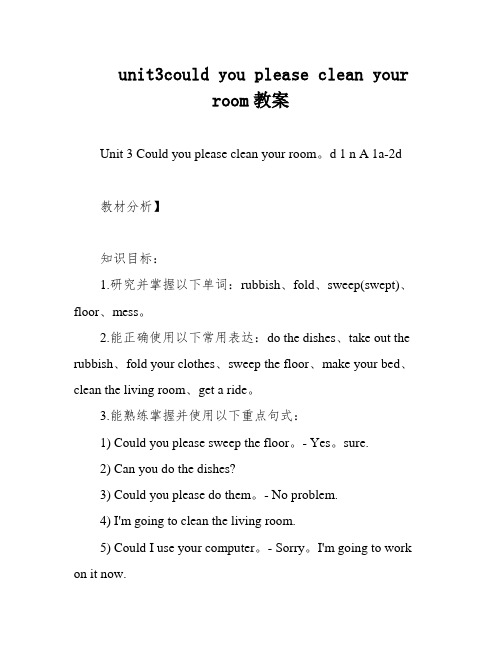
unit3could you please clean yourroom教案Unit 3 Could you please clean your room。
d 1 n A 1a-2d教材分析】知识目标:1.研究并掌握以下单词:rubbish、fold、sweep(swept)、floor、mess。
2.能正确使用以下常用表达:do the dishes、take out the rubbish、fold your clothes、sweep the floor、make your bed、clean the living room、get a ride。
3.能熟练掌握并使用以下重点句式:1) Could you please sweep the floor。
- Yes。
sure.2) Can you do the dishes?3) Could you please do them。
- No problem.4) I'm going to clean the living room.5) Could I use your computer。
- Sorry。
I'm going to work on it now.6) Could I watch TV。
- Yes。
you can。
but first you have to clean your room.7) Could you please help out with a few things?8) XXX?9) Could you take out the rubbish。
fold the clothes。
and do the dishes?能力目标:通过听说训练,学会谈论如何征求许可以及如何进行礼貌地请求。
情感目标:通过本课的研究,能够谈论如何征求许可以及如何进行礼貌地请求的方式,学会关心社会,帮助他人。
教学重点:谈论如何征求许可以及如何进行礼貌地请求,正确使用本课常用表达,听力训练。
Unit3-Could-you-please-clean-your-room课文讲解-

Unit3 Could you please clean your room?Section A1.Peter ,could you please take out the trash? 彼得,你能把垃圾倒了吗?【解析1】Could you please do sth ?请你(做)......好吗?用于提出请求,希望得到对方的肯定回答,说话的语气比较客气委婉。
Could 不是can的过去式,是委婉、礼貌的说法。
回答用can.【常用答语】肯定回答:Sure./ Of course./ Certainly./No problem.否定回答:Sorry , I can’t 【解析2】take out 取出(v+ adv)【注】: 跟代词做宾语,代词放中间;跟名词做宾语,可放在中间,也可放在后边【短语】take out the trash 倒垃圾take a walk 散步take away 拿走,取走take back 收回take place 发生take off 脱下;起飞The gift is in the box. You can take it out.2. Can you do the dishes.?那你可以洗盘子吗?do the dishes 洗碗【结构1】do the +名词:do the dishes/ laundry 洗餐具/衣服【结构2】do the +动词-ing do the cleaning 打扫卫生【结构3】do one’s + 名词do one’s housework/ homework 做家务/家庭作业【结构4】do some +动词-ing do some reading/ shopping 读写书/购物3.Could I at least finish watching this show? 至少让我看完这个节目可以吗?【解析1】Could I do a sth? 我可以做......吗?用于表达请求,语气比较委婉。
- 1、下载文档前请自行甄别文档内容的完整性,平台不提供额外的编辑、内容补充、找答案等附加服务。
- 2、"仅部分预览"的文档,不可在线预览部分如存在完整性等问题,可反馈申请退款(可完整预览的文档不适用该条件!)。
- 3、如文档侵犯您的权益,请联系客服反馈,我们会尽快为您处理(人工客服工作时间:9:00-18:30)。
Unit 3 Could you please clean your room? 附参考答案一.单项填空(共15小题;每小题1分,满分15分)从每小题所给的A、B、C、D四个选项中选出一个可以填入空白处的最佳选项。
( )1. —Could you please your room, Tom?—.A. cleaning, No problemB. clean, CertainlyC. to clean, Of courseD. clean, No I couldn’t( )2.—Do you like to_______ your bed?—No,I hate to_______ chores.A.do;do B.do;make C.make;do D.make;make( )3._______ you tell me how I_______ get to the No.168 Middle School?A.Do;can B.Can;could C.Could;can D.Could;could( )4. Miss White, I’m going out, could you _______ my child for a while?A. look forB. look overC. look atD. look after( )5.__________ you like a cup of tea?A. WouldB. DoC. AreD. Could( )6. It is a year of ox. My parents gave _____a nice toy ox on New Year’s Day.A. IB. meC. mineD. my( )7. —Meimei is _____the difficult math problem. —I’m sure she’ll _____.A. working on; work it onB. working out; work it outC. working out; work it onD. working on; work it out( )8. Could you _____the window? I feel a little cold.A. please not openB. please not to openC. not please to closeD. please not to close( )9. Many kids like ________ very much, but they are not good for their health.A.singersB. choresC. snacksD.watching TV( )10.—Could I use your computer, Dad?—Sorry, you _______. I’m going to work on it.A. wouldn’tB. can’tC. needn’tD. don’t have to( )11. ─ _____ do you do the dishes? ─ Every day.A. How soonB. How longC. How oftenD. When( )12. —Could you buy us _________ drinks?—Sorry, I don’t have _____ money.A. any; anyB. any; someC. some; someD. some; any( )13. Excuse me, Peter. There’s something wro ng with my car. Could I ?A. go for a driveB. get a rideC. give me a rideD. go for a walk( )14. There are still a few hamburgers. Would you like to have one, Julia?A. the otherB. otherC. othersD. another( )15. My dad tells me not to ________ too late in the evening. He says it is dangerous.A. stay outB. grow upC. come outD. get up二.完形填空(共10小题;每小题2分,满分20分)阅读下列短文,从每小题所给的A、B、C、D四个选项中选出一个最佳选项。
Lisa is serious about the chores in her house. She gives her children things that they 16 do according to their ages. She started by asking John, the 17 of her two sons, to help with the dishes. It is now an easy chore 18 the 15-year-old. His 13-year-old brother, Dave, now 19 John too. They take turns (轮流) washing the 20 each week. The boys also clean their study tables, make their beds and 21 food from the market on Sunday mornings. Besides (除了) these, the boys also know how to cook easy meals 22 their parents are not at home.The family of 23 live in a big house but they do all the housework themselves. Lisa says, "When I was young, my father wanted us to do things on our own and learn how to 24 ourselves. Now I’m doing it to my kids."John says, "Doing chores is 25 . You can learn important life skills and responsibility (责任)."( )16. A. must B. can C. may D. will( )17. A. elder B. taller C. younger D. shorter( )18. A. with B. as C. for D. by( )19. A. likes B. finds C. hates D. helps( )20. A. hands B. dishes C. fruit D. clothes( )21. A. borrow B. cook C. buy D. sell( )22. A. when B. how C. what D. why( )23. A. two B. three C. four D. five( )24. A. work on B.live in C.look at D. take care of( )25. A. difficult B. good C. bad D. boring三.补全对话(共5小题;每小题1分,满分5分)根据对话内容,从方框内的选项中选出能填入空白处的最佳选项,其中有两个为多余选项。
(Rose and Ann are talking about chores.)Rose: Ann, could you please get me some water?Ann: Sure. 26Rose: I’m sweeping the floor.Ann: Do you like it?Rose: 27 It’s too boring, but I have to do it. How about you?Ann: I hate sweeping the floor, too, but I like other chores.Ann: I like to make the bed and water theflowes.Rose: 29Ann: Yes. 30 And you?Rose: I agree. I often help my mother do the dishes.四.阅读理解(共10小题;每小题3分,满分30分)阅读下列短文,从每小题所给的A、B、C、D四个选项中选出一个最佳选项。
ADo teenagers in small villages do chores at home? How about the teenagers in big cities? Here is a survey. We asked 4,000 teenagers in China several questions. Half of them come from big cities like Beijing, Shanghai and Guangzhou.The others are from small villages. We made a diagram of the result of our survey. Let’s have a look at it.We found out that teenagers from small villages do more chores than those from big cities. Maybe it is because they live a harder life. Our advice toparents in big cities is that parents should give their children some chores to do. Doing chores( )31. They surveyed ______ teenagers from small villages.A. 1,000B. 2,000C. 3,000D. 4,000( )32. There are 1,000 teenagers from the cities who ______.A. take out the trashB. do the dishesC. make the bedD. fold the clothes( )33. Fewer than ______ teenagers in big cities sweep the floor and make the bed.A. 500B. 1,000C. 1,500D. 2,000( )34. The number of teenagers ______ in big cities is bigger than that in small villages.A. making the bedB. taking out the trashC. folding the clothesD.doing the dishes( )35. Why did they make the survey?A. Because they don’t want teenagers in China to do chores at home.B. Because they thought it’ll help teenagers to take good care of themselves to do choresat home.C. Because they wanted to know if teenagers in China do chores at home.D.Because they thought it’s not necessary fo r teenagers to look after themselves.BAn exhausted(筋疲力尽的)looking woman came into the doctor’s office. She said, “Doctor, there are a lot of dogs all over my neighborhood. They bark(犬吠)all day and all night, and I can’t get a good sleep.”“I have good news for you,” the doctor said, taking out a small bottle. “Here are some new sleeping pills(安眠药)that work like a dream. A few of these and your trouble will be over.”“Great, thank you.” the woman was very glad to go back home with the pills.A few weeks later, the woman came again, looked worse than ever. She said, “Doctor, your pills are not good at all. I’m more tired than before.”“I don’t understand how that could be,” said the doctor, shaking his head, “Those are the strongest pills on the market.”“That may be true,” answered the woman, “but I’m still up all night running after those dogs and when I finally catch one, it’s hard to get him to eat the pills.”( )36. The woman came to see the doctor because _____.A. her dog was illB. she was bitten(被咬)by dogsC. she couldn’t sleep wellD. her son was ill( )37. The doctor gave some pills to the woman for _____.A. the dogsB. herselfC. her sonD. her neighbors( )38. The woman got _____ in a few weeks.A. worseB. healthier `C. betterD. stronger( )39. Which of the following is RIGHT?A. The doctor gave the woman wrong pills.B. The woman liked to run with the dogs.C. The woman took the pills but the pills didn’t work at all.D. The woman might feel better if she took the pills.( )40. When he heard what the woman said, the doctor might think that _____.A. he gave the woman the right pillsB. the woman was a very clever personC. the woman was very foolish(愚蠢的)D. he should give the woman the pills again五.单词拼写(共10小题;每小题1分,满分10分)A)根据首字母及汉语提示,完成下列单词的拼写,使句意明确,语言通顺。
